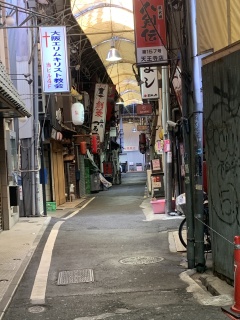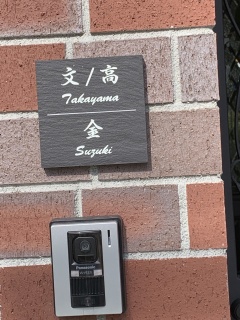it was always a work in practice
Nov. 3rd, 2022 02:09 pm· I’ve been visiting the local Korean markets for oksusu suyom cha, um…cornsilk tea? Very strong flavor, very delicious, very nostalgically Korean.
· In other fall food news, it’s the time of year when applesauce is good: i.e., buy the tartest apples I can find, chop them roughly without peeling, dump in a pot with some lemon juice, simmer (stirring and bashing occasionally) until even in texture, serve hot with cream and cinnamon. Mm. Also Y came home the other day saying “Someone at work gave me some homegrown potatoes!” Excellent, I said, give it here and I’ll fry them up with some onion. The dirt came off under water to reveal purple skins: sweet potatoes. Change of plans… (They were very good, if very sinful, fried in butter with salt.)
· Relatedly, my mother quoted me something from the psychologist Virginia Valien (Valian?), along the lines of “…how she contrasted her way of cooking with her way of writing. With cooking, it was always a work in practice. Too salty this time? Next time she’d use less salt. Next time she’d try some additional or alternative ingredient. She didn’t decide each time: oh, this didn’t turn out so well, so I’m a terrible cook. This didn’t turn out so well, it must be a terrible recipe, and I’ll never make it again.” (I think my brain works the opposite way! I rarely lose my nerve/interest with regard to writing, but messing up a recipe sure is demoralizing.)
· Listening rather obsessively to the opera Peter Grimes; I’m not usually much of a Britten fan, but this one has me. What he does with motifs—“I’ll marry Ellen!” “Grimes is at his exercises,” and so on—and ensemble singing in particular is fantastic. I wish I were still a musicology student, I’d love to spend a semester in a seminar on this one opera. (I’ve listened to a handful of different versions on YouTube and lost track of which one is which; haven’t yet heard an Ellen Orford I REALLY like, her music seems to need a particularly beautiful voice.) Frances Partridge, watching the premiere, loved it and wrote “I often longed to have some interesting, thrilling passage back to listen to it again,” and pace Walter Benjamin, now we can.
· For something completely different, Stevie Wonder’s “Don’t you worry ‘bout a thing”—a favorite of my father’s, and mine too, for its happy energy and its suspensions “when you check it ou-ou-out, when you get o-o-off your trip” and so on.
· The more Chinese I learn the more I don’t know, 越学越不懂; given things like 要不 and 不要 and 要不然 and 不然 and 然而 and 而是 and 就要 and 就是 and, you know, the other million options, I feel like I’m playing with a large box of legos which can be put together in any way and always make something, I just don’t always know what it’s supposed to be, and it’s hard to keep straight which shape and color of legos go together to make the things I want to say. (End of strained metaphor.) Japanese grammar works quite differently—like, ikaseraretakunakereba, a long word meaning “if you don’t want to be made to go,” is made up of dependent parts which can only mean one thing and can only be stuck onto verbs in a given order; there are fewer options, which is much easier to handle! (If I’d learned them in the opposite order I’m sure I’d feel the other way around…).
· Random assortment of photos: Walking across a bridge, a time-travel alley, cosmos (flowers), a stealth cat, ripening persimmons, and so on. Also, I wouldn’t normally post name plates, but this one, from a heavily Korean neighborhood, struck me as sociolinguistically unusual: the Korean names (Moon, Koh, Kim) are in kanji, and the “passing” Japanese names (Takayama, Suzuki) are in romaji. Probably done just for design, but it’s an interesting communication choice. (Suzuki is also an unusual passing name for Kim, whose bearers mostly go by Japanese names with the same character in them, like Kanemoto, Kanayama, Kinjo etc.)









Be safe and well.
· In other fall food news, it’s the time of year when applesauce is good: i.e., buy the tartest apples I can find, chop them roughly without peeling, dump in a pot with some lemon juice, simmer (stirring and bashing occasionally) until even in texture, serve hot with cream and cinnamon. Mm. Also Y came home the other day saying “Someone at work gave me some homegrown potatoes!” Excellent, I said, give it here and I’ll fry them up with some onion. The dirt came off under water to reveal purple skins: sweet potatoes. Change of plans… (They were very good, if very sinful, fried in butter with salt.)
· Relatedly, my mother quoted me something from the psychologist Virginia Valien (Valian?), along the lines of “…how she contrasted her way of cooking with her way of writing. With cooking, it was always a work in practice. Too salty this time? Next time she’d use less salt. Next time she’d try some additional or alternative ingredient. She didn’t decide each time: oh, this didn’t turn out so well, so I’m a terrible cook. This didn’t turn out so well, it must be a terrible recipe, and I’ll never make it again.” (I think my brain works the opposite way! I rarely lose my nerve/interest with regard to writing, but messing up a recipe sure is demoralizing.)
· Listening rather obsessively to the opera Peter Grimes; I’m not usually much of a Britten fan, but this one has me. What he does with motifs—“I’ll marry Ellen!” “Grimes is at his exercises,” and so on—and ensemble singing in particular is fantastic. I wish I were still a musicology student, I’d love to spend a semester in a seminar on this one opera. (I’ve listened to a handful of different versions on YouTube and lost track of which one is which; haven’t yet heard an Ellen Orford I REALLY like, her music seems to need a particularly beautiful voice.) Frances Partridge, watching the premiere, loved it and wrote “I often longed to have some interesting, thrilling passage back to listen to it again,” and pace Walter Benjamin, now we can.
· For something completely different, Stevie Wonder’s “Don’t you worry ‘bout a thing”—a favorite of my father’s, and mine too, for its happy energy and its suspensions “when you check it ou-ou-out, when you get o-o-off your trip” and so on.
· The more Chinese I learn the more I don’t know, 越学越不懂; given things like 要不 and 不要 and 要不然 and 不然 and 然而 and 而是 and 就要 and 就是 and, you know, the other million options, I feel like I’m playing with a large box of legos which can be put together in any way and always make something, I just don’t always know what it’s supposed to be, and it’s hard to keep straight which shape and color of legos go together to make the things I want to say. (End of strained metaphor.) Japanese grammar works quite differently—like, ikaseraretakunakereba, a long word meaning “if you don’t want to be made to go,” is made up of dependent parts which can only mean one thing and can only be stuck onto verbs in a given order; there are fewer options, which is much easier to handle! (If I’d learned them in the opposite order I’m sure I’d feel the other way around…).
· Random assortment of photos: Walking across a bridge, a time-travel alley, cosmos (flowers), a stealth cat, ripening persimmons, and so on. Also, I wouldn’t normally post name plates, but this one, from a heavily Korean neighborhood, struck me as sociolinguistically unusual: the Korean names (Moon, Koh, Kim) are in kanji, and the “passing” Japanese names (Takayama, Suzuki) are in romaji. Probably done just for design, but it’s an interesting communication choice. (Suzuki is also an unusual passing name for Kim, whose bearers mostly go by Japanese names with the same character in them, like Kanemoto, Kanayama, Kinjo etc.)









Be safe and well.
no subject
Date: 2022-11-04 02:07 am (UTC)In terms of vocabulary and having a kanji/hanzi base already, you mean? Or other aspects? Definitely, I'm not a very visual person and if I didn't already have a reading knowledge of kanji, learnt when my brain was younger and more flexible, I'd never make any progress with Chinese.
I struggle with the same
oh good it's not just me <3
I'd always assumed that a localised reading of the hanja/kanji would be adopted.
There is actually a whole range of usages! (I can ramble about names and language for ages, ignore as needed) Some people use the Korean names with Korean pronunciation--temporary residents, newcomers without much Japanese to draw on, people very involved with the Korean community and ethnic identities as (South/North/...) Korean. Others use, as you say, the Japanese reading of the Korean names--in the doctor's office the other day I heard a nurse call "Kin Tokusai, the doctor will see you now" and so on; others again use Japanese names, either in order to "pass" day-to-day (at school, at work etc.), or just for convenience. In general, the more "Korean-identified" people use a version of Korean names and the more "Japanese-identified" people use passing names, but that's a large generalization and most people may switch among all three options depending on the context.
no subject
Date: 2022-11-04 02:36 pm (UTC)On the hanzi/kanji vocabulary front, definitely, and also some grammatical aspects. It's been so long since I learnt Japanese that I don't recall very many examples... the one I do remember was mapping over that まだ and もう effectively functioned like 还 and 已经 in sentences, which saved me from the grief my classmates had in figuring out which to use in positive and negative contexts.
In general, the more "Korean-identified" people use a version of Korean names and the more "Japanese-identified" people use passing names, but that's a large generalization and most people may switch among all three options depending on the context.
Iiiiinteresting. That makes sense! Today I learnt something new. :D
no subject
Date: 2022-11-05 02:22 pm (UTC)Oh, that works! I don't think I ever consciously noticed that one but you're absolutely right. (The ones that always come to mind for me are 正好 and 果然, which are impossible to translate concisely into English but work out perfectly as ちょうど and やっぱり respectively...).